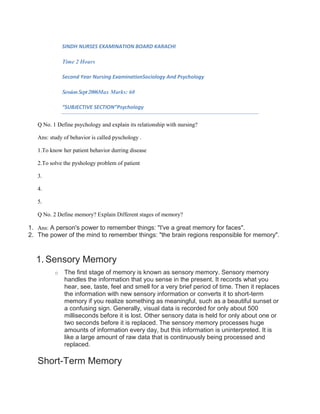
Sindh nurses examination board karachi
- 1. SINDH NURSES EXAMINATION BOARD KARACHI Time 2 Hours Second Year Nursing ExaminationSociology And Psychology SessionSept2006Max Marks: 60 “SUBJECTIVE SECTION”Psychology Q No. 1 Define psychology and explain its relationship with nursing? Ans: study of behavior is called pyschology . 1.To know her patient behavior durring disease 2.To solve the pyshology problem of patient 3. 4. 5. Q No. 2 Define memory? Explain Different stages of memory? 1. Ans: A person's power to remember things: "I've a great memory for faces". 2. The power of the mind to remember things: "the brain regions responsible for memory". 1. Sensory Memory o The first stage of memory is known as sensory memory. Sensory memory handles the information that you sense in the present. It records what you hear, see, taste, feel and smell for a very brief period of time. Then it replaces the information with new sensory information or converts it to short-term memory if you realize something as meaningful, such as a beautiful sunset or a confusing sign. Generally, visual data is recorded for only about 500 milliseconds before it is lost. Other sensory data is held for only about one or two seconds before it is replaced. The sensory memory processes huge amounts of information every day, but this information is uninterpreted. It is like a large amount of raw data that is continuously being processed and replaced. Short-Term Memory
- 2. o Between sensory memory and long-term memory is the stage known as short- term memory. Another name for it is working memory. Whereas the sensory memory can process incredible amounts of information, the short-term memory can hold only about seven items at a time. It retains this information for 20 to 30 seconds, unless the information is rehearsed, in which case it can be store the data for a while longer. Most of what the short-term memory holds is the awareness of how you feel, the things you sense and the thoughts you think. It can keep this information for a longer period of time because the information is encoded and grouped into more meaningful parts. Mnemonic devices, such as acronyms, are often used to group information together in ways that allow the data to remain in the short-term memory for longer periods. International Scholarships for Pak Study Abroad BScMSc PhD Scholarship Scholarship-Positions.com/Pakistan Long-Term Memory o The third stage of memory is called long-term memory. This memory is unlimited in capacity, unlike sensory memory and short-term memory. Information in the long-term memory is likely to stay there for a very long time, even an entire lifetime, without rehearsal or recalling it often. Rehearsing items in the short-term memory can cause them to be converted to long-term memory, but most long-term memories do not originate that way. People most often have long-term memories of especially meaningful events, such as their wedding day, a car crash or a child birth. The information stored in the long- term memory is highly interconnected and forms schemas, which are like groups of knowledge relating to a specific thing, such as a person, a concept or an item. Forgetting o The process of forgetting can be caused by several things. There may be a problem with the way the information was encoded, the way it was stored or the process of retrieving the memory. If information is not realized as meaningful and recorded accordingly, you are more likely to forget it soon. Another theory of forgetting blames decay as the reason some memories simply disappear after a period of time. Rehearsing information helps ensure information stays available to you and doesn't disappear with time. Q NO. 3 WRITE SHORT NOTES ON THREE OF THE FOLLOWING?1.PERCEPTION2.LEARNING3.PERSONALITY4.EMOTION
- 3. PERCEPTION 1. The ability to see, hear, or become aware of something through the senses. 2. The state of being or process of becoming aware of something in such a way LEARNING 1. The acquisition of knowledge or skills through experience, practice, or study, or by being taught. 2. Knowledge acquired in this way. 1. The act, process, or experience of gaining knowledge or skill. 2. Knowledge or skill gained through schooling or study. See Synonyms at knowledge. PERSONALITY IT IS UNIQUE ORGANIZATION CHARACTERISTIC WHICH DETERMINED TYPICAL OR RECURRENT PATTERN OF INDIVIDUAL .
